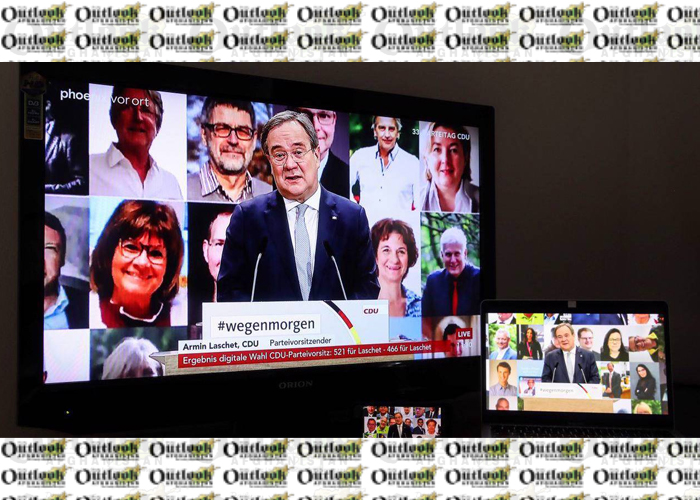The election of a European party leader – one of roughly 200 in the European Union – is normally not big news. But it is when the party is the strongest political force in the EU’s largest and richest country.
Over the weekend, Germany’s Christian Democratic Union (CDU) anointed Armin Laschet, the unassuming, friendly-faced prime minister of North Rhine-Westphalia, as its chairman. Laschet is not exactly a star on the world stage. But remember the name. Statistically, a Christian Democrat is the odds-on favorite for the chancellor’s job.
Five of Germany’s eight postwar chancellors have hailed from the CDU – from Konrad Adenauer to the current incumbent, Angela Merkel. And Merkel’s party currently leads in national polls by a wide margin, making it a safe bet that Merkel’s successor will again hail from the conservative camp after the general election in September.
Laschet faces a two-step process: first CDU chair, then chancellor candidate. Historically, the party chair has had first dibs as standard-bearer, but not necessarily a lock on the nomination, which is scheduled for March.
But, before we get to the complications, let’s look at Laschet, who went into the convention predicted to lose. With his surprise victory, he is now the front-runner for the chancellor candidacy. So, let’s posit that he will form the next government. What is to be expected?
In three words, “Merkel minus Angela” – maximum continuity. Laschet does not promise a new dawn, or a break with 16 years of Merkel’s centrism and its creeping leftward tilt. That shift has now been accelerated by the COVID-19 pandemic, which is driving a massive expansion of government spending and redistribution across the West. Trillions of euros are being showered on individuals and “system-relevant” corporations.
Expect “Merkelism” in foreign policy as well. In the three-way race for the top party job, Laschet’s two rivals – Friedrich Merz and Norbert Röttgen – promised to rebalance German interests in favor of “Westernism”: more for defense and NATO, fewer goodies for Russia and China. Laschet, though, would follow in Merkel’s footsteps.
Call it “diplomatic centrism.” Don’t let the United States drag Germany into conflicts with the two giants to the East. Keep your distance from Washington. Try to be on good terms with each and all, as befits Berlin’s position in the heart of Europe. As Chancellor, Laschet would not defy Russia by cutting the Nord Stream 2 pipeline that will pump Russian gas directly into the country, circumventing Poland and Ukraine and increasing German energy dependence on the Kremlin. Nor will Germany exclude Chinese 5G technology from its networks.
A sign of things to come is the EU-China Comprehensive Agreement on Investment, concluded under German leadership just three weeks before US President-elect Joe Biden’s inauguration. With the CAI, Biden’s hope of recruiting the EU into a strategic coalition against China evaporated. Indeed, together with the Regional Comprehensive Economic Partnership – which 15 Asian countries, including China, concluded the previous month – the EU-China deal has left the US out in the cold.
On Europe, the future under Laschet also promises continuity. That means open spigots for the European Central Bank, together with an ever-larger shift of spending and taxing powers to the European Commission, the EU’s unelected executive.
In her early years as chancellor, Merkel fought massive transfers of clout and cash to the EU tooth and nail. Now, the debt and transfer union is locked in, never mind who the next chancellor is. Even out of power, Merkel will thus continue to shape the EU’s future.
Although probability suggests that Laschet will be Mr. Chancellor once the Federal election ballots are counted on September 26, he will have to strain hard to unify the CDU and its Bavarian sister party, the Christian Social Union (CSU). Coming from behind at the convention last weekend, he barely made it on the second ballot, winning just 521 of 1001 votes.
Worse, in nationwide polls, just one-third of respondents thought Laschet might “make a good chancellor candidate.” Some 55% opted for the CSU’s boss Markus Söder, who is sure to challenge Laschet for the nomination. Indeed, Söder has been angling nonstop for the top prize.
What does Söder stand for? A more accurate question would be, “What doesn’t he stand for?” Söder has been shifting his positions with great alacrity, moving smoothly from right to left and back, be it on domestic security, immigration, “family values,” lockdowns, industrial policy, or a German version of the “Green New Deal.” Söder has insisted on Russia sanctions, but he has also made nice with Russian President Vladimir Putin while visiting the Kremlin.
Is there much of a difference between the two leaders of the two wings of German Christian Democracy? Laschet, to repeat, is “Merkel minus Angela.” Söder is a politico who tries to project charisma and fortitude, though his past suggests relentless flexibility, also known as indecisiveness or opportunism.
For the rest of the world, it matters little whom the party nominates in March. German multiparty coalition politics is not designed for sudden lurches, as in the case of Donald Trump following Barack Obama in the US. It is always a few degrees to the left or the right, plumbing the depths and steering clear of treacherous shoals – all while remaining finely tuned to the changing moods of the electorate.
Laschet or Söder for Chancellor? Merkel-plus or a Bavarian posing as a strongman? The third player, of course, is COVID-19. Last year, the efficient Germans excelled at holding the pandemic at bay. Today, the country is staggering from lockdown to lockdown as infections soar. If the crisis continues, the German electorate might prefer a roly-poly, predictable uncle from the Rhineland to the unbridled ambition of a would-be king from Bavaria.
Home » Opinion » Merkel Minus Angela
Merkel Minus Angela
| Josef Joffe

